| Srl | Item |
| 1 |
ID:
095025
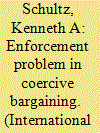

|
|
|
|
|
| Publication |
2010.
|
| Summary/Abstract |
This article explores the strategic problems that arise when a state seeks to use military force to compel changes in another state's policies. Although the costs associated with military action mean that there generally exist compromises that both sides prefer to conflict, bargaining may fail if such deals are not enforceable in the face of temptations to renege on policy concessions. This study develops a model that shows that inefficient conflict can occur when states bargain over policies that one of them can change unilaterally and covertly. I then show that this theory is useful for understanding a common source of international conflict: conflicts that arise when one state supports rebel groups engaged in a civil war with another state. Episodes of rebel support are associated with a substantial increase in the risk of interstate militarized disputes, the lethality of these disputes, and the likelihood of repeated violence. Agreements to limit rebel support are unlikely to reduce interstate violence unless they are coupled with concessions by the target state and/or monitoring mechanisms, both of which are shown theoretically to mitigate the enforcement problem.
|
|
|
|
|
|
|
|
|
|
|
|
|
|
|
|
| 2 |
ID:
065791
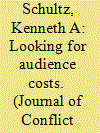

|
|
|
| 3 |
ID:
154745


|
|
|
|
|
| Summary/Abstract |
This article describes a new data set consisting of precise digital maps of regions that were the subject of interstate territorial disputes in the period 1947 to 2000. Each dispute identified by Huth and Allee is rendered as a polygon corresponding to the area subject to overlapping claims. After describing the data collection procedures and presenting some descriptive statistics, this article develops three novel results that demonstrate the potential of geospatial data to advance our understanding of the causes and consequences of territorial conflict. In particular, I use the data to (1) show how different measurements of the geographic extent of disputes can help unpack the mechanisms through which they dampen international trade, (2) cast doubt on the role of oil deposits in fueling territorial conflict by analyzing the relationship at a finer level of spatial resolution than previously possible, and (3) examine the harmful legacy of territorial conflict on local development in formerly contested regions along the El Salvador-Honduras border.
|
|
|
|
|
|
|
|
|
|
|
|
|
|
|
|
| 4 |
ID:
182701
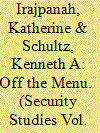

|
|
|
|
|
| Summary/Abstract |
Why do states no longer declare war? In a provocative analysis, Tanisha M. Fazal argues that states stopped declaring war to evade the costs of complying with the growing body of international humanitarian laws. We argue instead that post-1945 normative and legal developments that sought to prohibit war changed the meaning of war declarations in a way that made them at best irrelevant and at worst counterproductive. Although war-making did not end, a once routine feature of warfare came to be seen as a signal of extreme aims that could complicate escalation management and coalition building. Moreover, the United Nations (UN) system provided more desirable ways for states to justify military operations, particularly through self-defense claims. We support this argument through a reassessment of the empirical pattern of war declarations, an analysis of self-defense claims made under Article 51 of the UN Charter, and case studies of undeclared wars in the post-1945 period.
|
|
|
|
|
|
|
|
|
|
|
|
|
|
|
|
| 5 |
ID:
157276
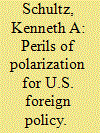

|
|
|
|
|
| Summary/Abstract |
Ever since the United States emerged from World War II as the preeminent global power, scholars and policymakers have been predicting its eventual decline. In the 1950s, the “loss of China,” the Korean War, and Sputnik all fed into fears about the United States’ ability to shape the postwar world.
|
|
|
|
|
|
|
|
|
|
|
|
|
|
|
|
| 6 |
ID:
060946
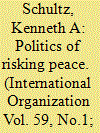

|
|
|
| 7 |
ID:
152327
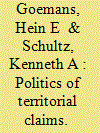

|
|
|
|
|
| Summary/Abstract |
Why do states make claims to some border areas and not others? We articulate three models of territorial claims and test them using a novel geospatial data set that precisely maps disputed and undisputed border segments in post-independence Africa. The geospatial approach helps eliminate problems of aggregation by permitting an analysis of variation both within and between dyadic borders. We find that ethnic political considerations are the most important driver of territorial claims in Africa, while institutional features of the border play a secondary role. Border segments that partition ethnic groups are at greatest risk of being challenged when the partitioned groups are politically powerful in ethnically homogeneous societies. Border segments that follow well-established and clear focal principles such as rivers and watersheds are significantly less likely to be disputed, while changes to the border in the colonial period created opportunities for later disputes to arise. Power considerations or resources play only a minor role in explaining the location of territorial claims.
|
|
|
|
|
|
|
|
|
|
|
|
|
|
|
|
| 8 |
ID:
134461
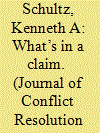

|
|
|
|
|
| Summary/Abstract |
This note uses a new data set on international territorial disputes and boundary agreements to explore whether and how legal commitments affect state behavior. Do border treaties reduce subsequent conflict simply through their effect on the distribution of the disputed good, or do treaties have legal and political implications such that a given distribution of territory has different effects depending on whether it is de facto or de jure? There are three main results. First, among states that have homeland territory disputes, the adoption of a legally binding border is associated with a significant reduction in the likelihood of future militarized conflict over the territory. Second, this effect is the same regardless of whether the treaty transfers territory or converts a de facto or contested border into a de jure border without changing the status quo distribution. Third, there is no equivalent reduction in conflict when states create explicitly provisional borders that allow them to retain their claims to areas that they do not possess. These findings suggest that border treaties do more than simply specify the distribution of territory and provide for transfers. By requiring states to renounce claims to territories that they do not receive, treaties generate ex ante costs of signing and/or ex post costs for reneging that explain their association with subsequent peace.
|
|
|
|
|
|
|
|
|
|
|
|
|
|
|
|
| 9 |
ID:
116176


|
|
|
| 10 |
ID:
152715
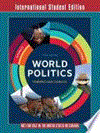

|
|
|
|
|
| Edition |
3rd ed.
|
| Publication |
New York, W W Norton and Company, 2010.
|
| Description |
xxxiii, 664p.pbk
|
| Standard Number |
9780393938098
|
|
|
|
|
|
|
|
|
|
|
|
Copies: C:1/I:0,R:0,Q:0
Circulation
| Accession# | Call# | Current Location | Status | Policy | Location |
| 059028 | 327.1/FRI 059028 | Main | On Shelf | General | |
|
|
|
|